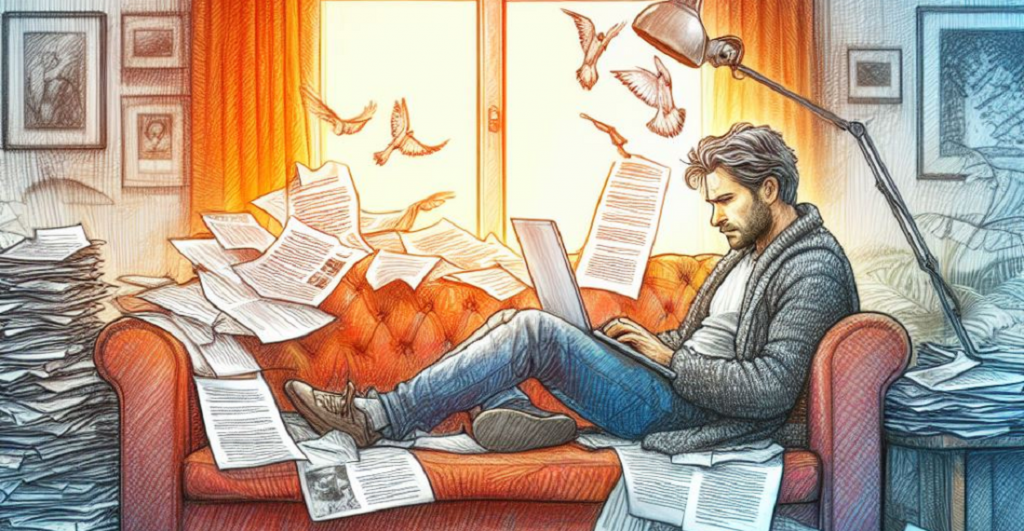
Writing my first book – was like setting sail into uncharted waters. Unfortunately, I can’t swim, so I put off the adventure, potentially filled with excitement, challenges, and the thrill of creation, for a long time. Was it by fear or laziness? I’m plagued by both.
Finding my North Star – “If there’s a book that you want to read, but it hasn’t been written yet, then you must write it.” — Toni Morrison. Before beginning, I had to ask myself: What story is burning inside me? There wasn’t one. What were the themes and messages I wanted to explore? There weren’t any. Maybe I could write something I was passionate about. That passion would be my North Star, guiding me through the darkest nights of writer’s block. But, I had no passion.
Money – I saw a documentary about someone making money by writing and selling books on Amazon. Like everyone else, I hated the 9 to 5 and figured, ‘I have an overactive imagination’, I can do that. Well, maybe not. And even if I did and had the talent and endurance to put it all together, I found out I was in a well of millions trying to do the same thing. Maybe they saw the same documentary. But I had spent hundreds of hours; should I cut my losses or see it through? Even knowing no one ever gets to read it. So, I carried on.
Please don’t do it for money!
Crafting Your World
“Read a thousand books, and your words will flow like a river.” ― Lisa See. World-building is not just for fantasy genres. Every novel requires a setting, and it’s your job to make it believable. The easiest way for me was to write about where I lived and the lives I imagined people were living around me. And the wildlife. But whether it’s a distant galaxy or your small town, it is important to immerse your readers in a rich and vivid world.
I’m not saying I succeeded in doing that. But I tried.
Creating Characters That Breathe
“You may tell a tale that takes up residence in someone’s soul, becomes their blood and self and purpose. That tale will move and drive them; who knows what they might do because of your words. That is your role, your gift.” — Erin Morgenstern. Your characters are the heart and soul of your novel. They need to be as real as the people in your life. Give them dreams, fears, flaws, and strengths. Let them grow and change because static characters are forgettable characters.
Plotting Your Course
“Find a subject you care about and which you in your heart feel others should care about. It is this genuine caring, not your games with language, which will be the most compelling and seductive element in your style.” — Stephen King. Some writers plan every detail, while others let the story unfold organically. Mine was organic. I can’t plan, and I’m disorganised and easily distracted. Whichever path you choose, ensure your plot has a clear direction. A novel without a plot is like a ship without a rudder—aimless and likely to be lost at sea.
The Discipline of Daily Writing
“Start writing, no matter what. The water does not flow until the faucet is turned on.” – Louis L’Amour. Writing a novel is a marathon, not a sprint. Set a daily word count goal and stick to it. Some days, the words will flow; others, it’ll be a trickle. What matters is the consistency of effort, not the day’s yield. Of course, I failed at all of the above, which is why it took years to write the small book.
Editing: The Art of Letting Go
“Most writers regard the truth as their most valuable possession, and therefore are most economical in its use.” — Mark Twain. Writing is rewriting. Be prepared to cut, revise, and sometimes, start over. It’s all part of the process. A good novel is not just written; it’s rewritten. Mine was rewritten at least 30 times. I’m not joking!
Seeking Feedback
“The Six Golden Rules of Writing: Read, read, read, and write, write, write.” — Ernest Gaines. No novel is an island. Seek beta readers, join a writing group, or hire an editor. Fresh eyes can catch what you’ve missed and provide the constructive criticism necessary to polish your manuscript. That was good advice, but I took none of it. Fear or shyness? Both and many more hangups besides.
The Path to Publication
“The greatest part of a writer’s time is spent in reading, in order to write; a man will turn over half a library to make one book.” — Samuel Johnson. Decide whether you want to take the traditional route or self-publish. Both have their merits and challenges. Research thoroughly and prepare for rejection. It’s a rite of passage for most writers. But most writers will be left with no choice.
The Journey Never Ends
“Lock up your libraries if you like; but there is no gate, no lock, no bolt that you can set upon the freedom of my mind.” — Virginia Woolf. Even after publication, the journey of a novelist never truly ends. There will be marketing, engaging with readers, and starting the next project. Because once you’ve tasted the joy of bringing a world to life, you won’t want to stop!